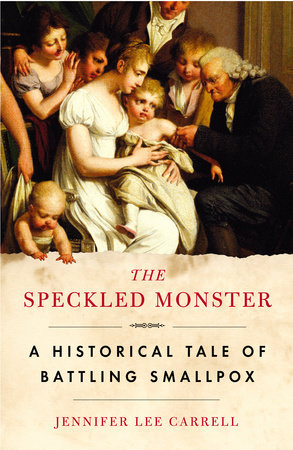READERS GUIDE
Questions and Topics for Discussion
INTRODUCTION
What is it like to be caught in the terror and chaos of a smallpox epidemic when you and those you love are unprotected? What is it like to get smallpox, or watch your children battle the disease?
The Speckled Monster tells the dramatic story—both historical and timely—of two parents who dared to fight back against the disease. After barely surviving the agony of smallpox themselves, they both flouted eighteenth-century European medical tradition by borrowing folk knowledge from African slaves and Eastern women in frantic bids to protect their children. From their heroic struggles stems the modern science of immunology as well as the vaccinations that remain our only hope should the disease ever be unleashed again.
Jennifer Lee Carrell transports readers back to the early eighteenth century to tell the tales of Lady Mary Wortley Montagu and Dr. Zabdiel Boylston: two iconoclastic figures who helped save the cities of London and Boston from the deadliest disease mankind has known.
PRAISE FOR THE SPECKLED MONSTER“Writing in a compelling, almost novelistic voice, Carrell details two 18th-century figures who struggled valiantly against smallpox. The disease becomes a character in the book, claiming the poor, the rich and the royal without distinction.” —USA Today
“Highly engrossing…Carrell tells this gripping story with ardor and skill.” —Smithsonian
“Jennifer Lee Carrell has brought smallpox back to life.” —Tucson Weekly
ABOUT JENNIFER LEE CARRELLJennifer Lee Carrell holds a Ph.D. in English and American literature from Harvard University and is the author of The Speckled Monster: A Historical Tale of Battling Smallpox. In addition to writing for Smithsonianmagazine, Carrell has taught in the history and literature program at Harvard and has directed Shakespeare for Harvard’s Hyperion Theatre Company. She lives in Tucson, Arizona.
DISCUSSION QUESTIONSWhat made specific individuals—Zabdiel Boylston, Lady Mary Wortley Montagu, the Princess of Wales, King George I—willing to risk inoculation in 1721—for their families, their cities and nations? What made others decide against it? Consider the following arguments: emotional and personal , scientific, religious, political , economic
How do these issues relate to modern concerns about vaccination? (Consider the different institutions of national government, the medical community, the military, local government and “first responders”, your family, yourself.)
All vaccinations risk killing or harming some percentage of otherwise healthy people, in order to protect the majority. (Going without vaccination potentially allows a disease to kill many more people: but then the disease is the killer, not the medical personnel or governments handing out vaccine.) When is this risk bearable? Who should get to decide?
Helpful numbers for discussion:
- smallpox kills between 14% and 30% of its victims
- inoculation with live smallpox virus—variolation—kills between 1% and 2% of patients
- the modern vaccine kills from 1 to 2 in a million patients (.0001% and .0002%)
- all these also leave some percentage of survivors permanently brain-damaged, blind and/or scarred.
- Review the politicians’ and doctors’ reactions to Boston’s smallpox epidemic of 1721. (See especially “The Beauty of the Sea,” “Caging the Beast” and “An Infusion of Malignant Filth”.) The major crisis was a sick and dying population. What else did Boston’s rulers fear? How might the government have dealt with all these problems better? What might be similar issues and problems today?
- In 1721, the British government tested smallpox inoculation on prisoners under sentence of death; it did so with the prisoners’ consent, and in exchange for pardons. In researching cures and vaccines for various diseases, the U.S. government has in the past run tests on human subjects both with and without informed consent—or any consent at all. Were the Newgate experiments conscionable within the ethos of 18th-century Britain? Why, or why not? (See especially “The Castle of Misery,” “Newgate,” and “The King’s Pardon”). Under what circumstances are experiments on human subjects conscionable today? Who should be asked—or allowed—to participate in such experiments? (If you answer “none” and “no one”, how should scientists test the safety of new vaccines and medicines?)
- What makes a medical hero? Was Zabdiel Boylston a hero? Specifically why, or why not? Was Lady Mary a hero? Charles Maitland? Caroline, Princess of Wales? Sir Hans Sloane? Under what circumstances might William Douglass have been a hero?

